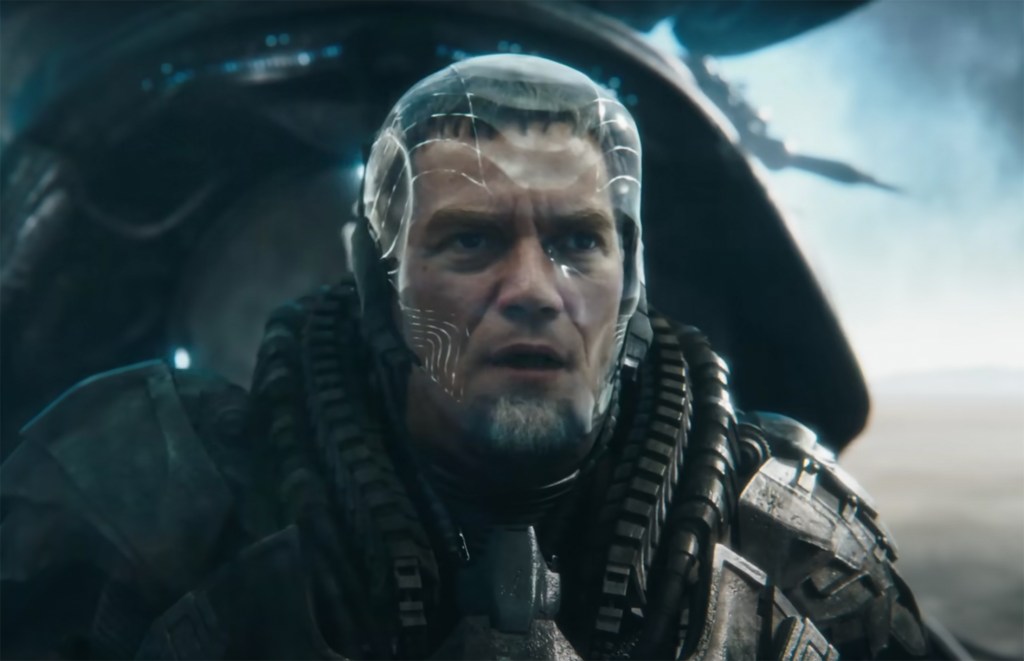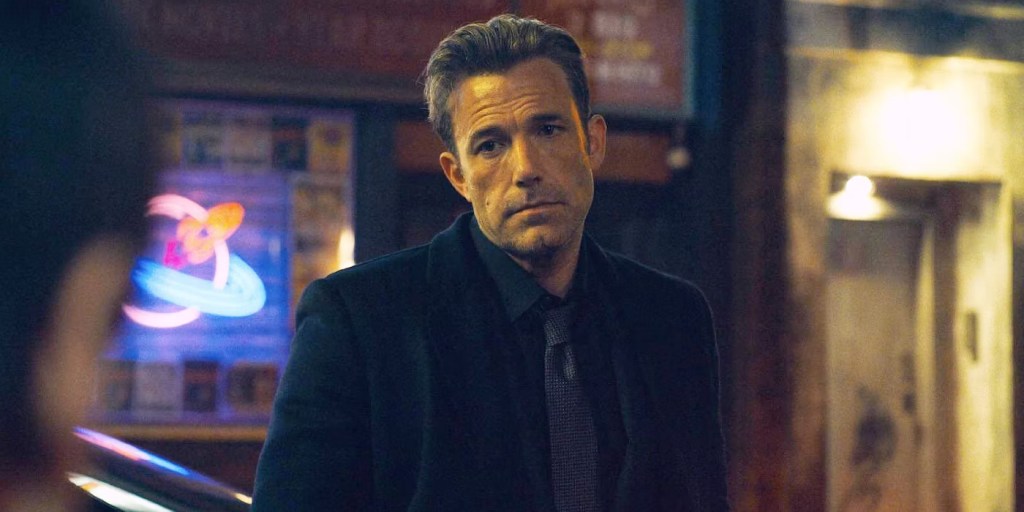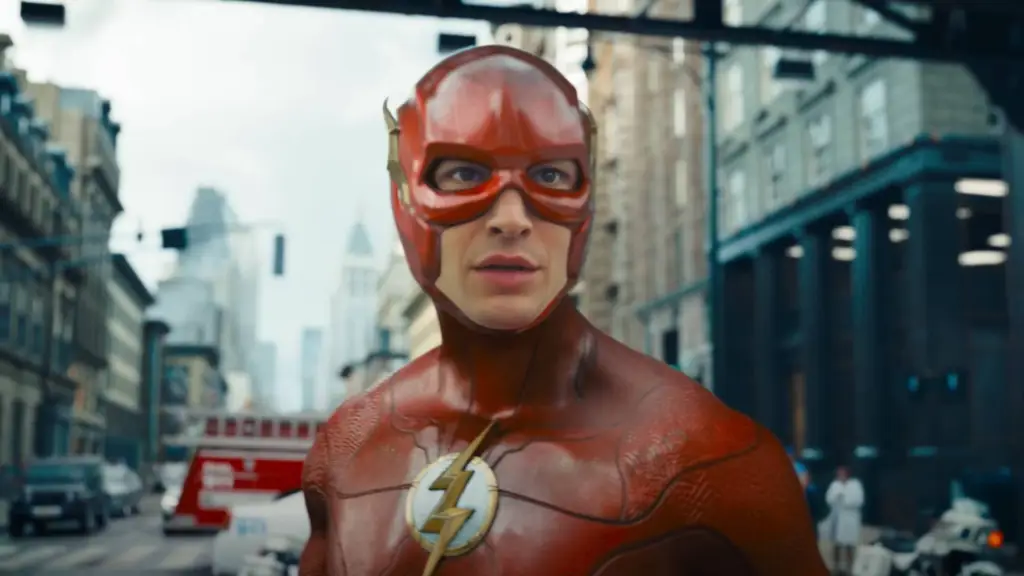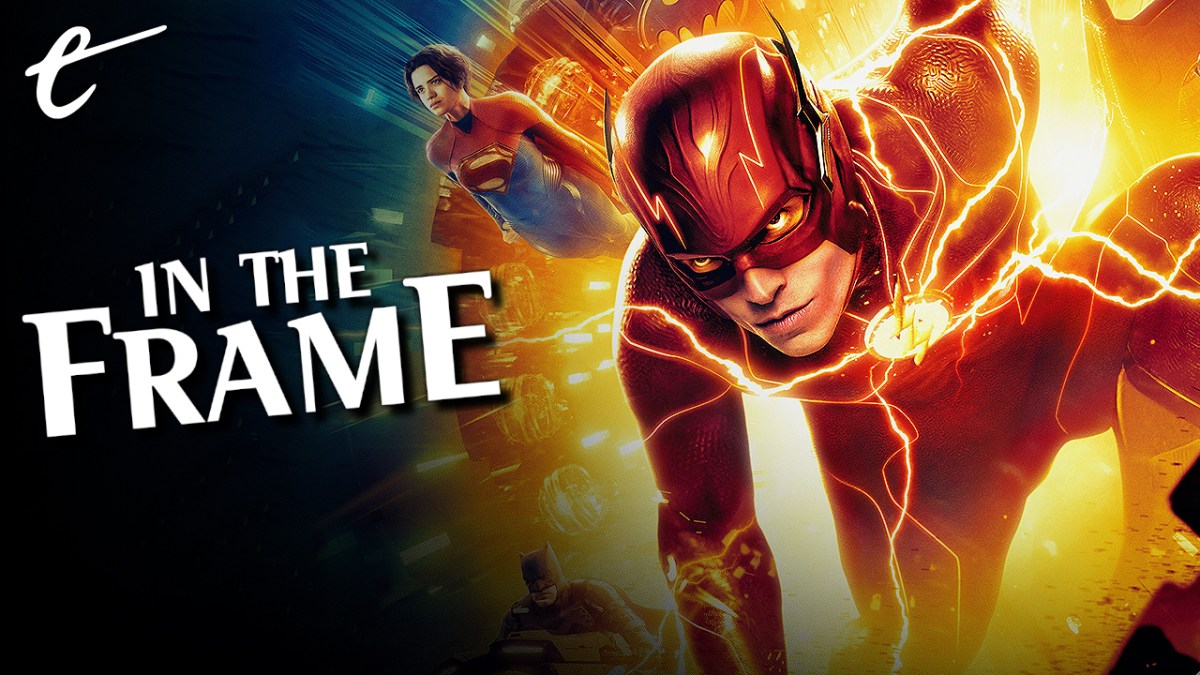This article contains ending spoilers for The Flash in its discussion of igniting a reboot in a movie that is ostensibly about why rebooting things is a bad idea.
There’s an interesting unresolved tension within The Flash, a contradiction that underscores the extent to which the movie exists primarily as a storing house for intellectual property rather than as a cohesive narrative of itself. As a story, The Flash is a movie about the folly of pursuing “perfection” as an ideal, the horror of living in the past while trying to revise and redraft a narrative to manifest its perfect form. Of course, as a product, The Flash is itself a clumsy attempt to do that very thing.
The starting premise of The Flash finds Barry Allen (Ezra Miller) traveling back in time to prevent the unsolved murder of his mother, Nora (Maribel Verdú), and the conviction of his father, Henry (Ron Livingston), for the crime. Using his powers, Barry hopes that he can create a better world. It’s essentially an attempt by Barry to polish the script of his life, to do a page-one rewrite on his story. It’s a fitting central metaphor for a movie as frequently and heavily rewritten as The Flash.
As demonstrated in the “fan favorite” moment from Zack Snyder’s Justice League, Barry’s superspeed gives him the power to turn back time as he approaches the speed of light. As a result, he has the power to keep going back. Any failure is just a temporary setback. At the climax of The Flash, as Barry finds himself trapped within a recreation of the climax of Man of Steel, he responds to the deaths of Batman (Michael Keaton) and Supergirl (Sasha Calle) by going back and resetting.
The climax of the movie reveals that the film’s villain is not General Zod (Michael Shannon). As Shannon has conceded, Zod is more of “an obstacle or a problem” than the primary antagonist. In the film’s third act, Barry discovers that the true villain is an alternate version of himself that has spent his life constantly tweaking the timeline in search of a perfect outcome that will give him everything that he wants. However, every attempt ends in failure, destabilizing the timestream.

This is the central theme of The Flash. It works at the level of basic human drama. After all, very few people live the perfect version of their possible lives, instead finding their paths derailed and altered by forces outside of their control. Part of growing up is accepting that reality, embracing the life one has rather than the life they wish they had. It’s a solid hook for a multiverse story, as demonstrated by Everything Everywhere All at Once and Doctor Strange in the Multiverse of Madness.
Indeed, one of the best individual scenes in the movie consists of a conversation between Barry and Bruce Wayne (Ben Affleck) in the alleyway outside his apartment. Barry insists he has the power to go back and fix everything. More than that, he can go back and save Bruce’s parents, reversing the trauma that turned him into the Caped Crusader. Bruce rejects the offer, explaining that he is the sum of his life experiences — his suffering, his mistakes, his losses. They made him who he is.
It’s a sweet moment, particularly coming from a character played by Ben Affleck. Affleck hasn’t had the easiest life. He has talked openly about his alcoholism, and there were frequent gossip items about his possible gambling addiction. He has spoken candidly about the dissolution of his marriage to Jennifer Garner. To put it charitably, his movie star career has been uneven — particularly when compared to that of his best friend, Matt Damon.
However, despite these very public troubles, Affleck seems to have found himself. He recently married Jennifer Lopez, and the relationship seems good for both of them. He has drifted away from his long-term creative home at Warner Bros., founding the film production company Artists Equity with Damon. He directed Air for the company, a movie that premiered to rave reviews and was picked up by Amazon for a sizable fee. Affleck’s life may not be perfect, but right now it seems happy.

There is also an undeniably meta subtext to all of this. It is no secret that Warner Bros. has not been particularly happy with its shared universe of DC films. It had hoped that these comic book adaptations would compete with Marvel Studios, but that never happened. Indeed, given recent indications that audiences may no longer be as enthusiastic about these sorts of films as they were five years ago — even those produced by Marvel Studios — it may never happen.
Like Barry, Warner Bros. has desperately and clumsily tried to revise its blockbuster superhero films in the hopes of creating something resembling a more “perfect” version. The studio’s original sin may be forcing Zack Snyder off Justice League mid-production, replacing him with Joss Whedon. The sane thing to do would have been to let Snyder finish his film and then either reboot or shift direction. Instead, the studio tried to change the angle of the shot in midair, with horrific results.
Those results fractured Warner Bros.’ plans for a shared universe. However, it also led to a number of unexpected and unforeseeable successes. Aquaman grossed over a billion dollars. Projects like Birds of Prey (and the Fantabulous Emancipation of One Harley Quinn), The Suicide Squad, Peacemaker, and even Zack Snyder’s Justice League garnered strong reviews. Outside the shared universe, The Batman was a massive success and Joker grossed over a billion dollars from a $55 million budget.
Again, it’s not perfection, but it’s something. This would seem to be the subtext of The Flash, a movie that is very much a sequel to Justice League, albeit without specifying which particular version of that movie. This is a story about the perils of trying to revise the universe in pursuit of a “better” version, instead arguing for the grace in accepting the world as it exists. This isn’t what Warner Bros. might have wanted for these properties, but it’s not a bad outcome by any measure.

After all, what is meaningfully accomplished by trying to reset it? The studio should have learned by now that such tinkering only ends in disaster. The studio might not have been happy with the $106 million profit that it made on Batman v Superman: Dawn of Justice, but it was a much better outcome than the reported $60 million loss it suffered on Joss Whedon’s Justice League. Like Barry, it is possible to get lost in that desire to continuously “redo” and “reboot” in the hope of finding “perfection.”
Of course, this is the text of the film. It is very different from the reality of the film. The Flash is a movie caught in the tension between what it is saying and what it is doing. Every theme, narrative, and character arc in The Flash is about the need for Barry to accept the world as it is, to make the most of what he has, and not to end up trapped (literally and figuratively) by the past. However, the production and the content of the movie pulls in the exact opposite direction.
Setting aside the themes and character arcs, The Flash is a movie that revels in the past rather than tries to escape it. It brings back actors like Michael Keaton and Michael Shannon, alongside computer-generated copies of George Reeves, Christopher Reeve, Helen Slater, and Adam West. It trumpets Danny Elfman’s Batman score on the soundtrack. It treats the Wayne Manor from the Tim Burton Batman films as a holy shrine. It recreates the climax of Man of Steel.
More than that, while the text of the movie is about the importance of accepting the world as it is, the function of the film as a piece of corporate product is to serve as an in-universe justification for a line-wide reboot. There is something bleak and depressing in this. In the past, reboots happened off-screen between movies like Batman & Robin and Batman Begins or between Superman Returns and Man of Steel. Now, these corporate maneuverings have to be rendered as the text of the movie.

So despite being a story about learning to accept that the past is fixed and the future lies ahead, The Flash constantly undermines its own themes. This is obvious even in the context of Barry’s personal motivation for time-traveling. When trying to save his mother breaks the timestream, he learns to let her go. However, the movie cannot help itself. Barry alters the timeline one last time, to provide evidence that will exonerate his father. It turns out that altering the past is only bad sometimes.
Similarly, that heartwarming sequence between Bruce and Barry in the alleyway is fatally undermined by the fact that it is the last time the audience sees Ben Affleck’s version of the character. Affleck’s version makes a compelling speech about accepting himself for who he is, and being comfortable with his identity, only for The Flash to erase him from reality. Initially, he was to be replaced by Keaton. In the final cut, it seems like he is replaced by George Clooney, for a joke.
As much as The Flash is a story about accepting the imperfect reality in which one lives, the film’s status as a storage locker for familiar intellectual property undermines that. At the climax of the story, as Barry’s alternate self rewrites the timeline, he creates more and more imperfect universes that crash into one another and wipe each other out. As much as The Flash positions itself as a love letter to cinematic iterations of these characters, the climax largely erases and destroys them.
Effectively, The Flash becomes a story about the restoration of the one perfect timeline, with all others treated as aberrations or deviations. It is, in that sense, similar to comic book events like Flashpoint or Crisis on Infinite Earths, editorial dictates disguised as narratives, “fan arguments as comics.” Functionally, it is a story about asserting the one “correct” alignment of all this intellectual property. In reality, it is a project diametrically opposed to what it purports to be about.
The Flash is ultimately a fascinating study of modern blockbuster realities, about what happens when the actual story of one of these movies crashes against the corporate edicts guiding it. It’s a movie about the futility of reboots that is ultimately forced into the shape of a reboot. It’s a bleakly cynical outcome. Everybody loses, especially the audience.






Published: Jun 19, 2023 11:00 am